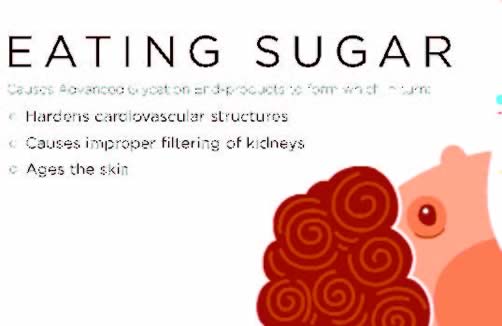Sugar ages the skin. Eat it sparingly
If your breakfast consists of processed foods such as cereals, cakes, baguettes, muffins, etc., which you wash down with sugar-laden ‘fruit’ juice, tea or coffee, you may not be doing your skin much good.
If your in-between snacks come across as pizza, biscuits, and frizzy drinks, you are already feasting too much on processed sugar and your skin risks premature ageing!
Many people spend fortunes on anti-ageing creams, but they don’t see the results. In fact, dermatologists say if you eat a diet high in sugar, you will be wasting money on such creams because your sugary diet will always work against those creams and lotions.
Processed sugar is a modern invention. While sugar is present in most foods, the hard, processed sugar and all its derivatives or alternatives are nothing short of poison. Or so food experts and physicians would have us believe.
A nutritionist, Dr. Remi Omotunde, says, “When sugar eaten in natural foods such as fruits, the fibre that fruit contains slows the overall digestion process, helping our bodies to prevent an increase in blood sugar and fat. As such, the absorption of sugars in fruit is different from the way the body absorbs refined sugars.”
According to dermatologists, regular eating of processed sugar can make your skin dull and wrinkled. Consultant Dermatologist, Dr. Ruth Olayinka, says when you eat sugar habitually, a natural process called glycation occurs.
She explains, “This is a natural process in which the sugar in your bloodstream attaches to proteins to form harmful new molecules that are medically referred to as Advanced Glycation End Products. The acronym is incredible, as it is called AGEs.
“In essence, as you eat more sugary foods, the AGEs in your bloodstream intensify. As time goes on, they accumulate and damage the adjacent proteins.
“In this case, the two protein fibres that keep the skin firm and elastic —collagen and elastin — are affected and their functions impaired. By the time this happens, ageing will be accelerated. And that’s why you see people in their mid-30s with prematurely wrinkled skin.”
The dermatologist says collagen is the most abundant protein in the animal kingdom and, therefore, the most prevalent protein in the body.
“When they are damaged as a result of external forces such as too much exposure to sunlight or, in terms of dietary habit, too much sugar intake, the otherwise springy and resilient collagen and elastin become dry and brittle, leading to the development of wrinkles and sagging skin,” Olayinka says.
She says AGEs not only cause the skin to be wrinkled, they also make cell structures to harden the way arteries harden to cause coronary heart disease.
“The same way the arteries harden when we eat too much fatty foods over the years is the same way AGEs make the cell structures to harden and lose their suppleness, resulting in ageing skin,” the physician enthuses.
She adds, “AGEs also interfere with the way the body renews itself through the production of new collagen and elastin. Once AGEs are set in motion, they make skin repair efforts difficult; and the body experiences accelerated ageing.”
Hope is not lost, though. Olayinka counsels that anyone whose diet has led to wrinkled, sagging and prematurely ageing skin can reverse the trend by eating balanced diet rich in fruit and vegetables.
She says this does not mean that you abstain from your favourite snacks and drinks. Rather, she says, it only means you eat those sugary foods sparingly and in little quantity. That way, you are able to balance up your diet at minimal stress.
Eat for your skin
Eat assorted vegetables such as red, yellow and orange vegetables. These include bell peppers and carrots, which contain carotenoids that can help reduce the appearance of wrinkles and make the skin look smoother.
Eat a variety of leafy green vegetables in order to get different types of vitamins and minerals that are vital for overall health.
Make it a habit to drink plenty of water and some green tea. Water rehydrates and plumps up the skin, while green tea warms your belly and contains anti-inflammatory compounds that soothe the skin.
Eat fish. Salmon contains essential Omega-3 fatty acids that strengthen cell membranes, allowing for better flow of nutrients and holding water in so your skin looks dewy.
Take healthy oils such as olive oil. Extra virgin or cold-pressed oil is preferable.
Eat minimally processed foods daily such as beans and peas, extra-lean meat or fish.
Eat zinc-rich foods. Zinc aids the normal functioning of the sebaceous glands in the skin. This gland produces oil and helps to repair skin damage and keep skin soft and supple. Zinc-rich foods include fish, lean red meat, whole grains, poultry, nuts, seeds and shellfish.
Eat walnuts, as they contain omega-3 essential fatty acids, which can improve skin’s elasticity. They also possess copper, a mineral that boosts collagen production.
The bottom line: If beauty is skin deep, nourish yours with good food!








